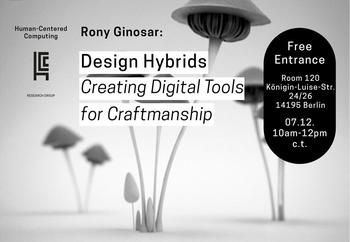Guest Talk by Rony Ginosar, Hebrew University of Jerusalem
December 7th, 10AM - 12PM c.t., Rony Ginosar will give the talk "Design Hybrids- Creating Digital Tools for Craftsmanship" at the HCC Lab
News from Nov 05, 2018
Rony Ginosar is a M.Sc. student in the School of Computer Science at the Hebrew University of Jerusalem as well as a B.Des student of Visual Communications at The Bezalel Academy of Arts and Design. As part of the Design Hybrids Lab she focuses on the research of digital design, craft and fabrication, and human-computer interaction (HCI).
The goal of Rony Ginosar's stay in Berlin is to further her academic studies by cooperatively undertaking a design project connected to the BMBF funded research project IKON, in which FUB’s Human- Centered Computing Lab (HCC) cooperates with the Museum of Natural History Berlin. This project develops a visualization application (web and touch display) for research information on natural history.
The overall goal of project IKON is the development of a strategy for Knowledge Transfer at the museum. Project IKON is conceived to support the transfer of expertise in such disciplines as Biodiversity and Ecology into society, politics and industry; as well as into educational and pedagogical offers at the museum. Therefore, IKON will be a key contributing factor to extending the reach of sustainability practices and expertise to stakeholders from academia, politics, industry and society.
The talk will be given in room 120, Königin-Luise-Straße 24-26.
Abstract
At the Design Hybrids Lab we study the design and implementation of hybrid solutions, merging contemporary (and digital) design and fabrication capabilities within traditional making disciplines. We learn the ethnographic aspect of making and creativity, investigating how traditional symbolic practice can contribute to new design and fabrication research to empower today’s creative practices.
Engaging in studies and research on the verge of both disciplines, we ask a question of making parametric design procedures more accessible to traditional designers and crafts people - we envision the use of catalogues in parametric design, replacing abstract design procedures with a given set of visual options to select from and react to.
The lecture is supported by the University Alliance for Sustainability, that facilitates the exchange on sustainability-related research and teaching with the Hebrew University of Jerusalem.
More:


